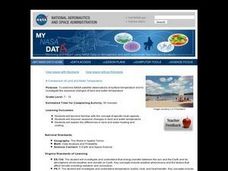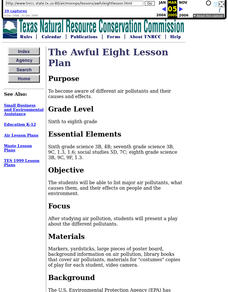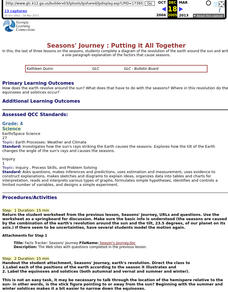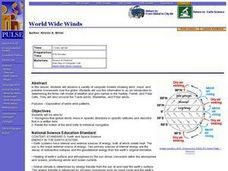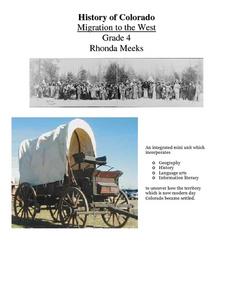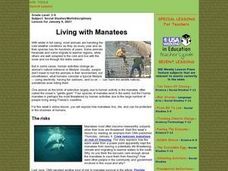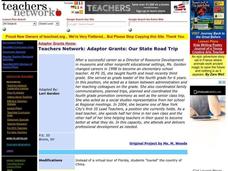Curated OER
A Comparison of Land and Water Temperature
Students use the NASA website's Live Access Server to create a graph of surface temperature at two locations on earth. They analyze the data and then answer specific questions provided in this lesson. They also examine and compare the...
Curated OER
Japan and Art
Students discuss the art of Japan as it relates to Japanese culture and geography and then create individual postcards reflecting the information learned from the lesson. This lesson includes possible enrichments.
Curated OER
Making Sense of Unusual Findings
Students work on the development of observation skills and seeing how they can be used in different contexts. The lesson is good for helping the beginner and novice, along with encouraging and reminding the expert observer of right...
Curated OER
A Cultural Palette
Students examine pieces of music and art that represent who they are. They study Haitian culture and traditions by performing the musical production "Once on the Island." They watch and discuss the film "The Nature of Music."
Curated OER
The Awful Eight Lesson Plan
The students list major air pollutants, what causes them, and their effects on people and the environment. Students list ways they can prevent or reduce the types of air pollution mentioned in the play.
Curated OER
Seasons' Journey : Putting it All Together
Third graders complete a diagram of the revolution of the earth around the sun and write a one paragraph explanation of the factors that cause seasons.
Curated OER
The Awful 8: The Play
Students become aware of the cause and effects of different air pollutants. They present a play about the different pollutants.
Curated OER
Introduction to Ecology
Eighth graders identify the living and nonliving components of an ecosystem. In this ecology lesson, 8th graders explain the role each organism plays. They participate in class discussion and answer a quiz at the end of the lesson.
Curated OER
Trees: Are They Thriving or Surviving?
In this trees survival lesson plan, 8th graders discuss what trees need to grow, brainstorm things that could adversely affect tree growth, and compare characteristics of thriving trees vs. surviving trees. Students learn about the...
Curated OER
What is Drought?
Students explore and conduct an experiment on the effects of drought on the environment. They define what drought is and the impact that a shortage of rainfall can have on agriculture, municipal water supplies, tourism, recreation, etc.
Curated OER
Bringing the Rain to Kapiti Plain
Students identify the African Plains and the plants and animals that are found on the plain, which are of a benefit to humans. They listen to the story and actively participate in a choral reading of Bringing the Rain to Kapiti Plain.
Curated OER
Celebrate The Four Seasons
Students investigate cause and effect and compare and contrast how recurring cycles are evident in multiple aspects of their education. They answer questions in the chosen field. Students model each aspect by interpreting, perceiving and...
Curated OER
Name that Wind
Young scholars study wind and the direction terms related to wind. For this meteorology lesson, students learn about the wind directions by completing a wind direction activity where kids locate cones marked with the specific wind...
Curated OER
The Rifting of Pangaea and the Gettysburg Battlefield
Eleventh graders analyze and interpret an animated model of Earth’s rifting processes. In this Earth Science lesson, 11th graders connect Earth’s rifting processes with the Earth’s surface in the Gettysburg battlefield. ...
Curated OER
The Many, Varied, and Unusual Places and Things on Earth
Learners discover how energy flows through communities because of the relationship between producers, consumers and decomposers. Examining various ecosystems, they identify the materials that cycle continuously through them. They label...
Curated OER
World Wide Winds
Students recognize that global winds move in specific directions in specific latitudes and describe that in a written form. They relate the motion of the wind belts to historical navigation.
Curated OER
Advanced Paragraph Correction #4
In this grammar worksheet, students read the passage and then answer the questions about errors in the passage. There are 8 questions to answer.
Curated OER
Tropical Atlantic Aerosols
Students analyze NASA data from the Multi-angle Imaging Spectroradiometer. In this NASA data lesson plan, students access an assigned website to examine information from the MISR on the Terra Satellite. They determine how desert dust...
Curated OER
History of Colorado-Migration to the West
Fourth graders identify reasons for people moving to the Colorado Territory and examine how moving in the 1800's is different than moving today. They also practice reading maps and gathering information from maps, as well as, describe...
Curated OER
Analyzing Journey North Maps
Students analyze what's happening and interpret why it's happening as the season progresses.
Curated OER
Major Ocean Surface Currents
Students investigate wind driven surface currents and prevailing winds by playing a card game. The cards are sorted by north or south and Atlantic or Pacific. They then predict where the two currents are found and what their...
Curated OER
Living with Manatees
Students research the lives of manatees and how humans are contributing to their survival. They visit a variety of websites including a webcam.
Curated OER
Our State Road Trip
Students take a virtual tour of the country of China instead of a state. Using the Internet, they examine the differences between a political and physical map and use latitude and longitude to locate specific places. They also research...
PBS
Pbs: Are the World's Weather and Climate Changing?
What's going on with our weather? Learn about it in this lesson plan that examines the climate and weather patterns in the world today. It has a weather quiz and guidelines that help the students understand weather changes occurring...


